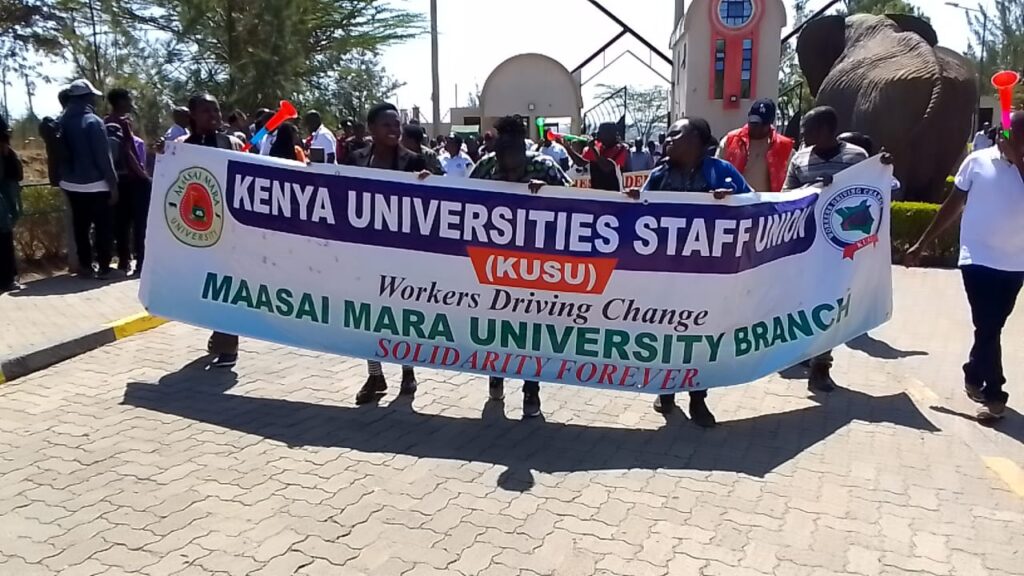
Nairobi, September 24, 2025 — National Assembly Speaker Moses Wetang’ula has appealed to striking university staff unions across the country to suspend their ongoing industrial action and give dialogue a chance, warning that the prolonged standoff is threatening the future of higher education in Kenya.
The strike, led by the University Academic Staff Union (UASU) and the Kenya University Staff Union (KUSU), has entered its second week, disrupting learning across public universities and leaving tens of thousands of students stranded. Lecturers and non-teaching staff have downed their tools, demanding better salaries, improved working conditions, and the implementation of a long-pending Collective Bargaining Agreement (CBA).
Wetang’ula Calls for Reason and Responsibility
Speaking during a parliamentary briefing on Tuesday, Wetang’ula urged union leaders to reconsider their hardline stance and prioritise the interests of students and the country at large. He acknowledged the legitimacy of the staff’s grievances but maintained that dialogue, not strikes, offers the most sustainable solution.
“The government recognizes the concerns raised by university staff, but industrial action should not come at the expense of innocent students. I appeal to our lecturers and non-teaching staff to suspend the strike and embrace dialogue as a patriotic duty to safeguard the academic future of our youth,” Wetang’ula said.
The Speaker emphasized that strikes in higher education institutions often result in prolonged academic calendars, delayed graduations, and a loss of morale among students, many of whom have already endured disruptions from previous strikes.
Impact on Students and Institutions
The strike has left lecture halls deserted, libraries closed, and essential services within universities crippled. Students preparing for examinations and those in their final year have been hit hardest, with fears that the strike could delay graduations and disrupt academic programs.
Universities, already grappling with financial strain and reduced government funding, are facing mounting pressure as the strike drags on. Several institutions have warned that unless the impasse is resolved quickly, academic schedules will be derailed significantly.
Government–Union Deadlock
The ongoing standoff stems from disagreements over salary arrears and the full implementation of the 2017–2021 CBA. Union leaders argue that the government has failed to honor its commitments, leaving staff demoralized and underpaid.
UASU officials insist that only concrete offers will convince them to return to work, while KUSU has accused the Ministry of Education of neglecting the welfare of non-teaching staff.
In response, the government has urged unions to show flexibility, citing budgetary constraints. The Ministry has also indicated readiness to engage the unions in fresh talks if the strike is called off.
Wetang’ula’s Mediation Role
As Speaker of the National Assembly, Wetang’ula stressed that Parliament is willing to play a mediating role between the government and the unions to ensure a quick resolution. He said the education sector is too important to be held hostage by protracted industrial disputes.
“Parliament is prepared to facilitate discussions that will bring both sides to consensus. We must avoid situations where students pay the heaviest price for disagreements between the government and unions,” he added.
Appeal for Compromise
Wetang’ula’s intervention comes at a critical time, as the strike shows no signs of abating. His appeal highlights the growing concern that the continued stalemate could undermine Kenya’s reputation as a regional hub for higher education.
The Speaker urged unions to demonstrate goodwill by suspending the strike while talks continue, insisting that trust-building measures are essential to reaching a lasting solution.
Way Forward
With the academic calendar hanging in the balance, stakeholders are watching closely to see whether union leaders will heed Wetang’ula’s appeal. Parents and students have also joined calls for compromise, urging both sides to prioritize learning over confrontation.
As negotiations loom, the pressure is on the government to make meaningful concessions and for unions to exercise restraint. For now, the future of thousands of students rests on whether dialogue can triumph over deadlock in Kenya’s troubled university sector.



